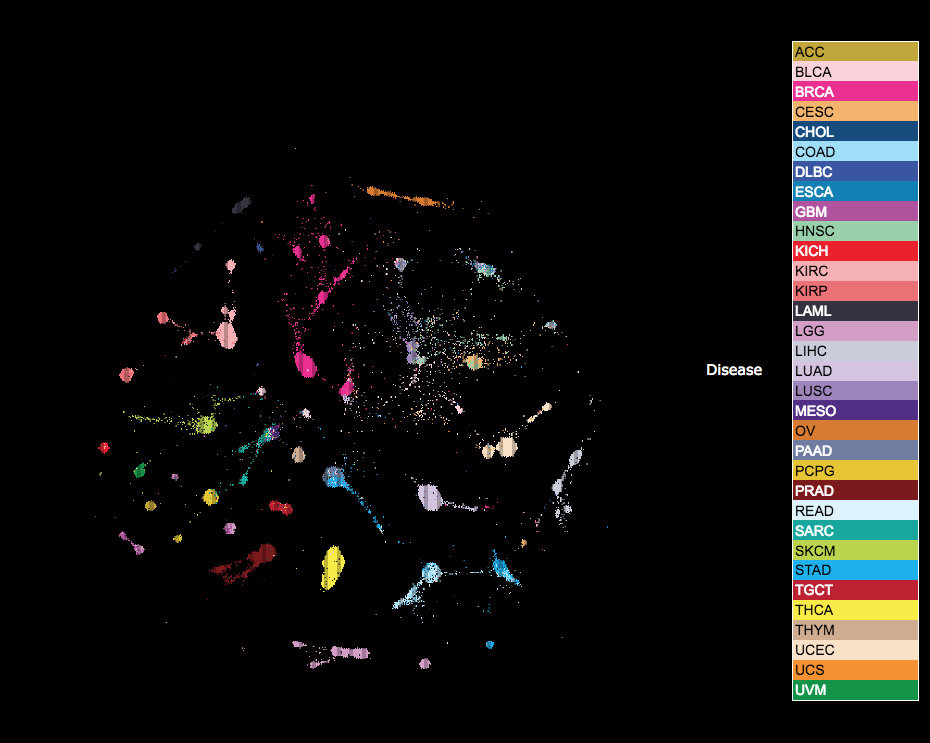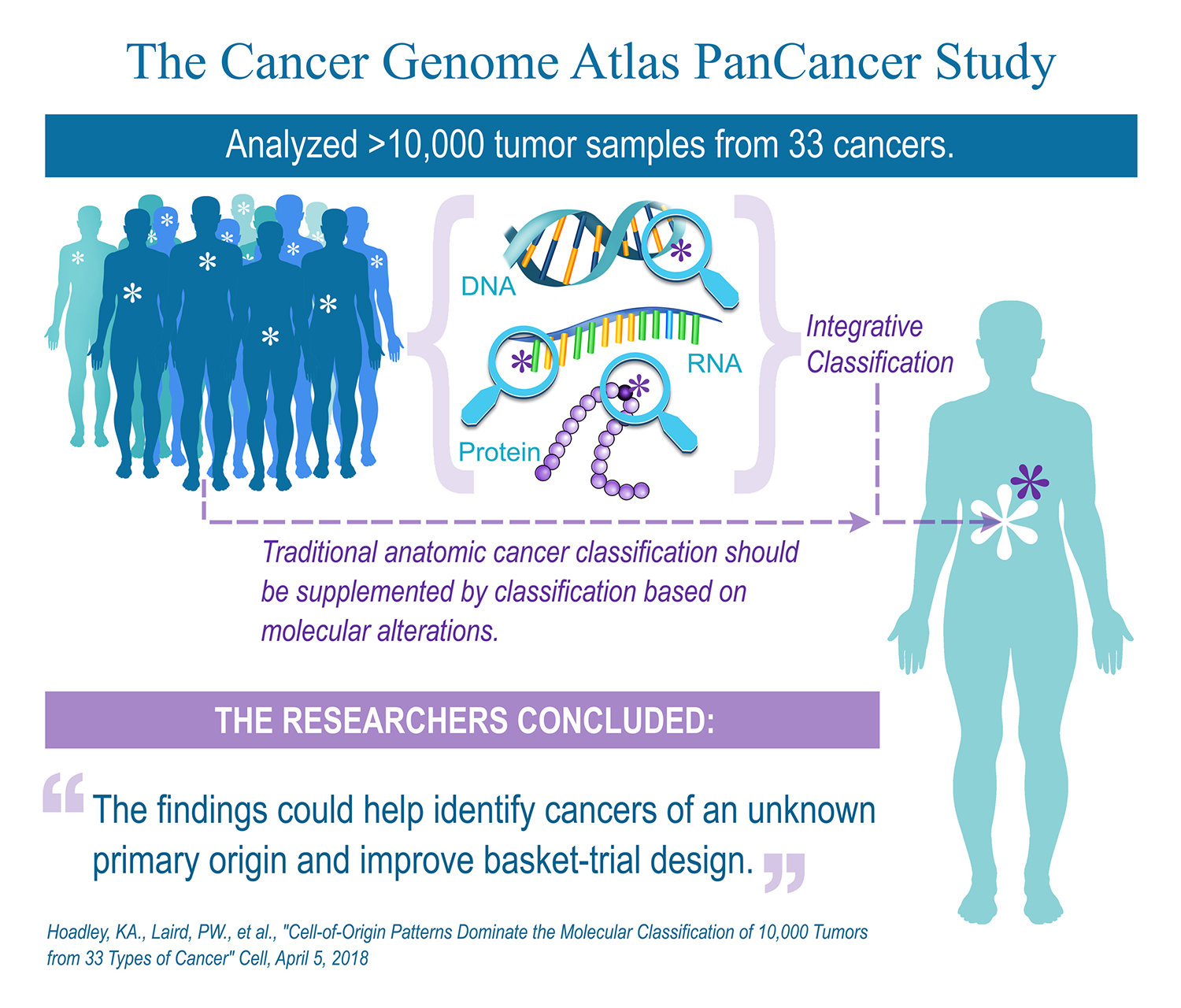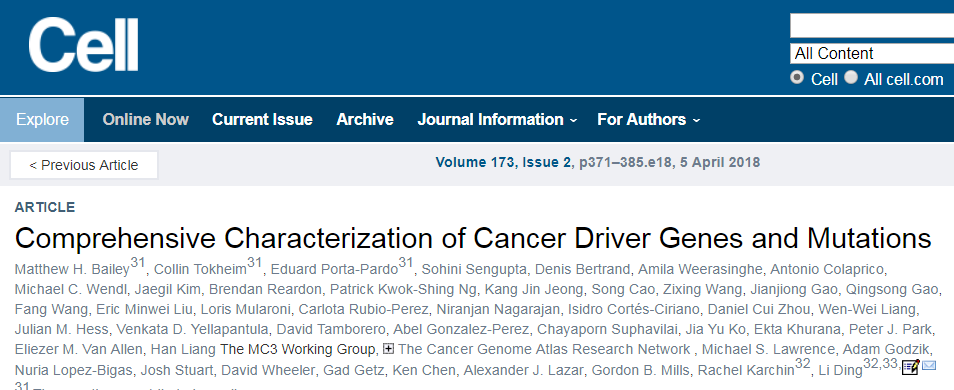Release date: 2018-04-11

Image source: Cell
For a long time, cancer has been classified mainly according to the "origination location" in the body, such as breast cancer, stomach cancer and so on. However, a collaborative project called the Pan-Cancer Initiative, launched in 2012, plans to study cancer from another perspective. Previous preliminary analysis showed that cancers originating from different organs actually have something in common at the molecular level, and cancers originating from the same tissue may have very different genomic features.
The most comprehensive cross-cancer analysis
Recently, the Pan-Cancer Initiative released a larger analysis of genomic and molecular data involving 33 different cancers from more than 10,000 patients. The results were published in the form of 27 papers in Cell, Cancer Cell, and Cell Reports. This is by far the most comprehensive cross-cancer analysis and the final result of the Cancer Genome Atlas program.

The UCSC Tumor Map helps researchers visualize the dominant patterns found in the TCGA data, such as the cell of origin, molecular histology, 'stemness' or differentiation status, specific altered genetic pathways, and the immune system component of the tumors. Credit: UC Santa Cruz Genomics Institute
Subversion of cancer classification
The organizer of the Pan-Cancer Initiative is Professor Josh Stuart of the University of California, Santa Cruz. Professor Christopher Benz, a clinical oncologist at the University of California, San Francisco, is one of his main collaborators.
As early as September 2013, Stuart et al. completed the first wave of cross-tumor comparisons. At the time, they analyzed 12 different types of tumors. Stuart said: "When we find similarities between different types of cancer, we hope to do a more comprehensive analysis."
In 2014, he published a related paper as a co-author. In this study, scientists used statistical analysis of tumor molecular data to classify tumors according to subtypes or clusters.
Later, in collaboration with an international team of scientists, they conducted a comprehensive molecular analysis of the complete set of TCGA tumor data. The latest published results show that 33 tumors analyzed can be reclassified into 28 different molecular types based on their cellular and genetic composition, rather than their origin.

Researchers analyzed more than 10,000 tumor samples from 33 cancers to reveal a new molecular classification system. Credit: Hoadley, KA., Laird, PW., et al., "Cell-of-Origin Patterns Dominate the Molecular Classification of 10,000 Tumors from 33 Types of Cancer" Cell, April 5, 2018.
Profound milestones
Professor Stuart said: "These papers are milestones. Now, we can see the full picture of cancer, which makes me hopeful about 'understanding the complexity of cancer.' I also believe that once scientists begin to study the data carefully, Its clinical impact will not fall too far behind."
Professor Benz said that these findings will provide a new foundation for future cancer research and clinical trials. If a patient's tumor can be first classified according to genomic and molecular composition, then they will have the best chance of getting the best treatment.
At the same time, Professor Benz also pointed out that these results also support a gradual recognition that FDA-approved specific immunotherapies for the treatment of a cancer may benefit many other types of cancer patients. The PD-1 antibody is the best example. In addition to being used to treat a variety of cancers including melanoma, non-small cell lung cancer, renal cell carcinoma, classic Hodgkin's lymphoma, head and neck cancer, bladder cancer, colorectal cancer, liver cancer, and gastric cancer, these drugs are also FDA. The first approved anticancer therapy that does not distinguish tumor sources [detailed].
Identification of approximately 300 genes driving tumor growth
In addition to the subversion of cancer classification, in a series of results published during the same period, the team of scientists led by Dr. Li Ding of the University of Washington identified about 300 genes that drive tumor growth. It is worth noting that more than half of all tumors analyzed carry genetic mutations.

The top right section shows all genes found to be important in multiple cancer types. Credit: Cell (click link to view) Big picture: http://pic.biodiscover.com/files/6/t4/biodiscover1523357494.7890156.jpg)
Dr. Ding said: "By analyzing the tens of thousands of tumor samples, we have learned in detail the genetic mutations that drive cancer and the genetic errors that accumulate with age. These genetic errors make the tumors specific and capable of guiding The molecular characteristics of treatment."
"Our findings also support the notion that any tumor carrying a large number of mutations (which are often resistant to chemotherapy) is susceptible to checkpoint inhibitors (a type of cancer immunotherapy). Because high-mutation tumors produce relatively more deformed proteins that trigger an immune response. Although the body forms a mechanism to suppress this immune response in order to prevent autoimmunity, checkpoint inhibitors can eliminate this. Mechanisms that allow the immune system to fight tumors more effectively," she added.
It is worth mentioning that the new study further investigated the BRCA1 gene that drives breast and ovarian cancer. Dr. Ding said: "We have long known that BRCA1 is an important gene in the development of cancer, but it has been difficult to figure out which mutations in BRCA1 drive cancer and which mutations are harmless. In the latest research We found 21 pathogenic BRCA1 and BRCA2 mutants in breast cancer, three in cervical cancer, one in colorectal cancer, and one in malignant glioma. 38 species were found in ovarian cancer."
Dr. Ding said that previously, the design of most early clinical trials did not take into account genomics. Now, we can sequence a patient's tumor sample to find a correlation between its genomics and drug efficacy, which will help design better therapies.
Attachment: screenshot of some related papers




Reference materials:
New 'Pan-Cancer' analysis reveals the common roots of different cancers
Major milestone reached in effort to ID cancers' genetic roots
Source: Bio-Exploration
Cleaner Products,Toilet Bowl Cleaner Liquid,Toilet Block Cleaner,Stain Remover Cleaning
Wuxi Keni Daily Cosmetics Co.,Ltd , https://www.kenicosmetics.com